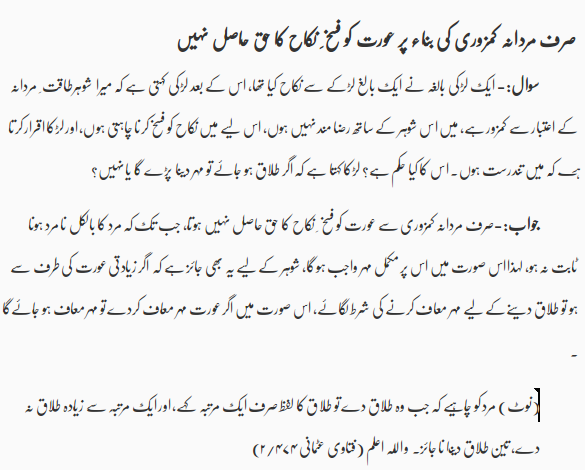Q: Kindly study the following scenario and advise whether the wife’s claims constitute valid grounds for Faskh or not.
The wife claims that during her fourteen years of marriage her sexual needs have not been fulfilled. She argues that despite engaging in intercourse with her husband, he leaves her unsatisfied having fully exercised his sexual right. The husband does not suffer from any ailments, but does not attend to her satisfaction after ejaculation. The husband feels that he is fulfilling her right by merely engaging in intercourse with her and that he is not obliged to fully satisfy her. She has made numerous attempts to resolve the issue, but to no avail. She claims that her sexual rights have not been fulfilled, and now fears committing Zina or engaging in other lewd acts. The husband’s behaviour has led to extreme levels of frustration due to which she suffers emotionally and due to which the marriage has broken down.
A senior Alim of our department was previously involved in the resolution of a similar case. In this instance, the wife, who is a Hafizah and observes full Hijaab confessed to committing Zinaa on more than one occasion due to a similar problem faced by the woman in scenario number one.
We are aware that according to the common laws of Faskh such a claim does not constitute valid grounds for the annulment of Nikah since the husband does not suffer from impotency or other sexual health related diseases. However, in view of the severe repercussions that may arise from the husband’s behaviour and considering the appalling state of our communities, can such a claim, if genuine and proven be considered as valid grounds for Faskh?
Your esteemed response will be very much appreciated.

A: The cases of husbands being deficient in satisfying their wife’s conjugal needs are something that existed in every era. One such incident that occurred in the time of Rasulullah (Sallallahu Alaihi Wasallam) was that of the wife of Hadhrat Rifaa’a (Radiallahu Anhu). After being given three talaaqs from Hadhrat Rifaa’a (Radiallahu Anhu), she married Hadhrat Abdurrahman ibn Zabeer (Radiallahu Anhu). On account of the second husbands deficiency in satisfying her conjugal needs she expressed her desire to Rasulullah (Sallallahu Alaihi Wasallam) to return her to her former husband Hadhrat Rifaa’a (Radiallahu Anhu), whereupon Rasulullah (Sallallahu Alaihi Wasallam) exclaimed:
لا حتى تذوقي عسيلته و يذوق عسيلتك (ترمذي 1/213)
Despite this problem being common, the Fuqahaa did not consider it as sufficient grounds for making faskh of the nikaah. The only situation the Fuqahaa allow faskh (in regard to fulfilling conjugal rights) is where the problem reaches its extreme i.e. where the husband is completely impotent. Even in that case, the faskh is subject to stringent conditions (as recorded in الحيلة الناجزة ).
However, in this era the problem apparently seems to be increasing and growing in society. One needs to examine the problem from all dimensions before passing a ruling, in order to ascertain the root cause that is triggering such conditions. If the problem is not treated from its roots then the problem will not be eliminated and if the woman is remarried after faskh it is likely that the same problem may resurface.
At times the problem is created due to exposure to western culture which incites such abnormal behaviour e.g. freely intermingling among the sexes, going to places that enhances ones sexual feelings or at times being exposed to anti-Islamic practises and involvements e.g. obscene literature, movies, mxit, twitter, facebook, etc. Sometimes the husband could also be at fault due to allowing his sexual desires to be stimulated through other impermissible causes (e.g. misusing his eyes, body limbs, freely speaking to women in the work environment, etc.) thereby weakening his sexual stamina and libido. If the both (husband and wife) are not advised to lead a pure Islamic lifestyle, governed by the Sunnat then both will never be satisfied with each other. In all probability, the front that will be put up by the wife to escape from the nikaah is that the husband is not sexually efficient, though the problem could lie elsewhere (as is seen in the case of the wife of Hadhrat Rifaa’a (Radiallahu Anhu) where Rasulullah (Sallallahu Alaihi Wasallam) understood that she had inclinations towards her first husband).
Nevertheless, after ascertaining that there is a definite problem in this regard (not influenced by any of the above-mentioned causes) then khul’a could be proposed to the wife. She could pay a certain amount of wealth to the husband (if he agrees) in lieu of the talaaq, as is proven from the Hadith in Abu Dawood Shareef:
عن عمرة بنت عبد الرحمن بن سعد بن زرارة أنها أخبرته عن حبيبة بنت سهل الأنصارية أنها كانت تحت ثابت بن قيس بن شماس وأن رسول الله -صلى الله عليه وسلم خرج إلى الصبح فوجد حبيبة بنت سهل عند بابه فى الغلس فقال رسول الله صلى الله عليه وسلم من هذه. فقالت أنا حبيبة بنت سهل. قال ما شأنك. قالت لا أنا ولا ثابت بن قيس. لزوجها فلما جاء ثابت بن قيس قال له رسول الله صلى الله عليه وسلم هذه حبيبة بنت سهل. وذكرت ما شاء الله أن تذكر وقالت حبيبة يا رسول الله كل ما أعطانى عندى. فقال رسول الله صلى الله عليه وسلم لثابت بن قيس خذ منها. فأخذ منها وجلست هى فى أهلها.( رواه أبو داود 1/303)
والله أعلم

Answered by:
Checked & Approved:
